-
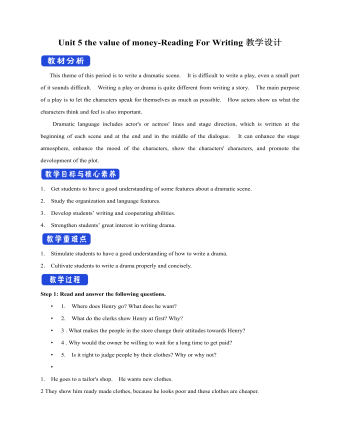
新人教版高中英语必修3Unit 5 the value of money-Reading For Writing教学设计一
【参考范文】Narrator:(Henry is smiling as he leaves the restaurant. As he is walking down the street, he sees a sign for a place that cuts hair. He decides to get it cut. )H=Henry;B=Barber;R=rude manH:Good afternoon, I'd like to get a cut, if I may. (The barber looks at Henry's hair and continues cutting another man's hair. )Er, I'd really like a haircut. As you can see it's much too long. B:(in a rude manner) Yes, I can see that. Indeed, I can. H:Fine, well I'll have a seat then. (He sits in one of the barber's chairs. The barber turns to look at Henry. )B:It's quite expensive here, you know!Are you sure you can afford it?H:Yes. I think so. (In comes the rude man. )R:Hey you there. I need a haircut quickly. Can you do me straightaway?B:All right, then, get in the chair and I'll see what I can do. R:Thank you. (sits down in one of the barber's chairs)H:Excuse me, but I was here first. Aren't you going to do my hair first?B:This man's in a hurry. H:Well so am I!I insist that you cut my hair first. B:OK, but I'll have to be quick. This gentleman is waiting. H:Thank you. (They both become quiet. After his hair is cut, the barber tells Henry how much he must pay. Henry shows the barber the bank note. )B:Why, Mr . . . (looks shocked)H:Adams. Henry Adams. I'm sorry, I don't have any change. R:You're that Mr Adams! Well,I'm glad I waited or I might never have known it was you. B:Why, Mr Adams, please don't worry!(wearing a big smile) Nothing to worry about!Nothing at all!Please come back any time, even if you only need too little hairs cut!It will be my honour to serve you!
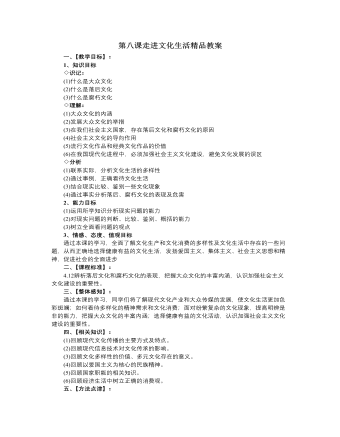
人教版高中政治必修3第八课走进文化生活精品教案
1.加强社会主义文化建设的必要性在人类历史的长河中,各种思想文化总是相互冲击、交汇、融合.奔腾向前,永不停息。今天,我们面对的文化有传统的和现代的、外来的和本土的、进步的和落后的、先进的和腐朽的、积极的和颓废的,等等。各种各样的文化有吸纳又有排斥,有融合又有斗争,有渗透又有抵御,呈现出前所未有的相互交织、相互激荡之势。在这种文化发展的大背景下,在我国现代化建设过程中,有必要弘扬我国社会主义的主流文化,这样有利于保证我国社会主义文化发展的方向。2.大力加强社会主义文化建设(1)中国特色社会主义文化在我国文化生活中处于主导地位。中国特色社会主义文化,始终坚持以科学的理论武装人,以正确的舆论引导人,以高尚的精神塑造人,以优秀的作品鼓舞人,无论是思想内容还是表现形式,都发挥着强有力的导向和示范作用。社会主义文化以其自身的科学性和先进性,并依靠社会主义政治和经济力量,在人民大众的文化生活中始终占据着主导地位。
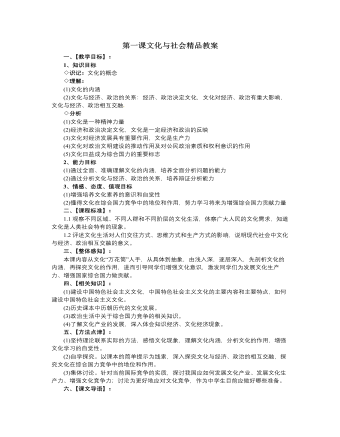
人教版高中政治必修3第一课文化与社会精品教案
(2)历史课本中历朝历代的文化发展。(3)政治生活中关于综合国力竞争的相关知识。(4)了解文化产业的发展,深入体会知识经济、文化经济现象。五、【方法点津】:(1)坚持理论联系实际的方法,感悟文化现象,理解文化内涵,分析文化的作用,增强文化学习的自觉性。(2)自学探究。以课本的简单提示为线索,深入探究文化与经济、政治的相互交融,探究文化在综合国力竞争中的地位和作用。(3)集体讨论。针对当前国际竞争的实质,探讨我国应如何发展文化产业、发展文化生产力、增强文化竞争力;讨沦为更好地应对文化竞争,作为中学生目前应做好哪些准备。六、【课文导语】:文化,一个我们十分熟悉的词汇。然而“熟知并非真知”。有人说,文化是知识;有人说,文化是艺术。究竟什么是“文化”?只要在社会生活中细细体味,我们就能真切地感悟“文化”的内涵与文化的力量。
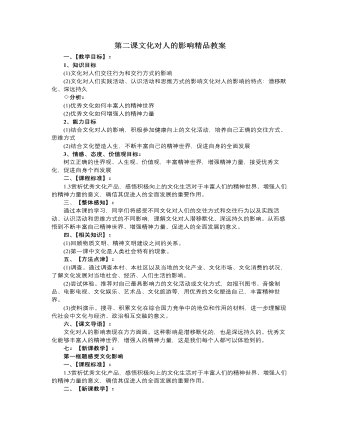
人教版高中政治必修3第二课文化对人的影响精品教案
民族精神是一个民族赖以生存和发展的精神支撑。一个民族,没有振奋的精神和高尚的品格,不可能自立于世界民族之林。“铁人”精神是“爱国、创业、求实、奉献”的大庆精神的典型化、人格化。其主要方面包括:“为祖国分忧、为民族争气”的爱国主义精神;为“早日把中国石油落后的帽子甩到太平洋里去”,“宁肯少活二十年,拼命也要拿下大油田”的忘我拼搏精神;干事业“有条件要上,没有条件创造条件也要上”的艰苦奋斗精神;“要为油田负责一辈子”,“干工作要经得起子孙万代检查”,对工作精益求精,为革命“练一身硬功夫、真本事”的科学求实精神;不计名利,不计报酬,埋头苦干的“老黄牛”精神;等等。40多年来,“铁人”精神早已家喻户晓,深入人心,成为大庆人的共同理想、信念和行为准则。“铁人”精神是对王进喜崇高思想、优秀品德的高度概括,体现了我国工人阶级精神风貌和中华民族传统美德的完美结合。“铁人”精神是战胜困难、勇往直前、不断取得新胜利的巨大精神力量。“铁人”精神是我们强大的精神支柱。
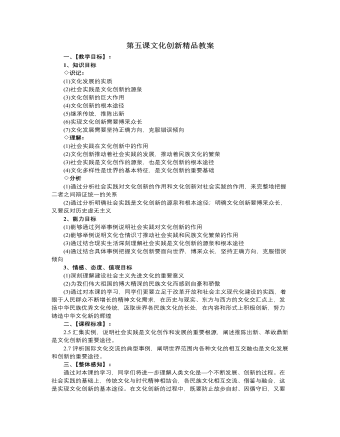
人教版高中政治必修3第五课文化创新精品教案
3.社会实践对文化创新的决定作用社会实践对文化创新具有两个方面的重要作用:(1)社会实践是文化创新的源泉实践,作为人们改造客观世界的活动,是一种有目的、有意识的社会性活动。人类在改造自然和社会的实践中,创造出自己特有的文化。离开了社会实践;文化就会成为无源之水、无本之木,人们不可能从事任何有价值的文化创造。◇本课小结:1.关于本课逻辑结构的宏观把握:文化创新的源泉和作用这一问题,教材分三个层次展开论证:一是不尽的源泉,不竭的动力;二是巨大的作用,深刻的意义;三是呼唤文化创新的时代。教材运用辩证方法从文化创新的源泉和作用展开论述。即社会实践是文化创新的源泉,文化创新又推动社会实践的发展和促进民族文化的繁荣。教材关于文化创新的途径问题,从三个层次展开讲述:第一个层次是“继承传统,推陈出新”;第二个层次是“面向世界,博采众长”;第三个层次是“坚持正确方向,克服错误倾向”。
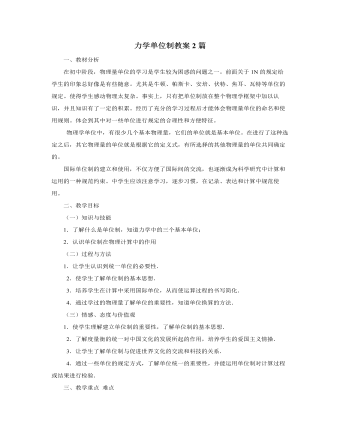
人教版新课标高中物理必修1力学单位制教案2篇
一、教材分析在初中阶段,物理量单位的学习是学生较为困惑的问题之一。前面关于1N的规定给学生的印象总好像是有些随意。尤其是牛顿、帕斯卡、安培、伏特、焦耳、瓦特等单位的规定。使得学生感动物理太复杂。事实上,只有把单位制放在整个物理学框架中加以认识,并且知识有了一定的积累。经历了充分的学习过程后才能体会物理量单位的命名和使用规则。体会到其中对一些单位进行规定的合理性和方便特征。物理学单位中,有很少几个基本物理量,它们的单位就是基本单位。在进行了这种选定之后,其它物理量的单位就是根据它的定义式,有所选择的其他物理量的单位共同确定的。国际单位制的建立和使用,不仅方便了国际间的交流,也逐渐成为科学研究中计算和运用的一种规范约束。中学生应该注意学习,逐步习惯,在记录、表达和计算中规范使用。二、教学目标(一)知识与技能1.了解什么是单位制,知道力学中的三个基本单位;2.认识单位制在物理计算中的作用
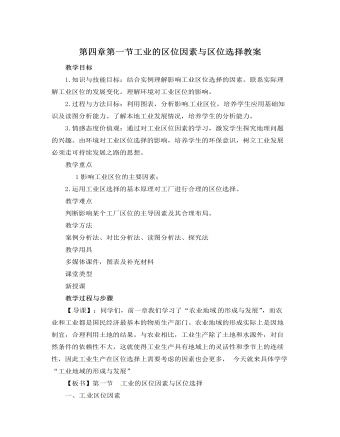
人教版新课标高中地理必修2第四章第一节工业的区位因素与区位选择教案
教学目标1.知识与技能目标:结合实例理解影响工业区位选择的因素。联系实际理解工业区位的发展变化。理解环境对工业区位的影响。2.过程与方法目标:利用图表,分析影响 工业区位,培养学生应用基础知识及读图分析能力。了解本地工业发展情况,培养学生的分析能力。3.情感态度价值观:通过对工业区位因素的学习,激发学生探究地理问题的兴趣。由环境对工业区位选择的影响,培养学生的环保意识,树立工业发展必须走可持续发展之路的思想。教学重点1影响工业区位的主要因素;2.运用工业区选择的基本原理对工厂进行合理的区位选择。教学难点 判断影响某个工厂区位的主导因素及其合理布局。教学方法 案例分析法、对比分析法、读图分析法、探究法教学用具 多媒体课件,图表及补充材料课堂类型
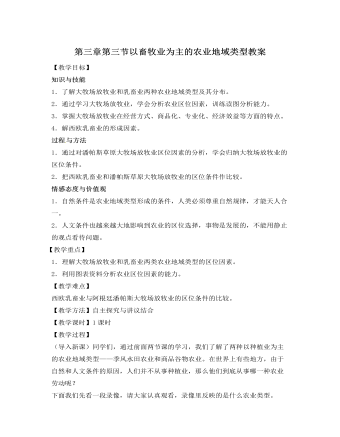
人教版新课标高中地理必修2第三章第三节以畜牧业为主的农业地域类型教案
知识与技能1.了解大牧场放牧业和乳畜业两种农业地域类型及其分布。2.通过学习大牧场放牧业,学会分析农业区位因素,训练读图分析能力。3.掌握大牧场放牧业在经营方式、商品化、专业化、经济效益等方面的特点。4.解西欧乳畜业的形成因素。过程 与方法1.通过对潘帕斯草原大牧场放牧业区位因素的分析,学会归纳大牧场放牧业的区位条件。2.把西欧乳畜业和潘帕斯草原大牧场放牧业的区位条件作比较。情感态度与价值观1.自然条件是农业地域类型形成的条件,人类必须尊重自然规律,才能天人合一。2.人文条件也越来越大地影响到农业的区位选择,事物是发展的,不能用静止的观点看待问题。【教学重点】1.理解大牧场放牧业和乳畜业两类农业地域类型的区位因素。2.利用图表资料分析农业区位因素的能力。
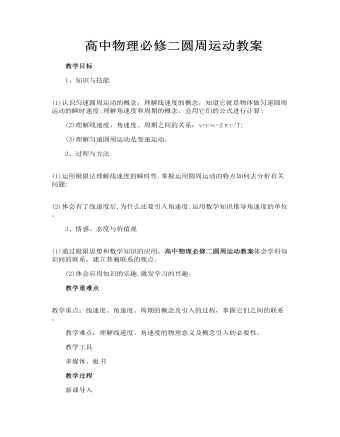
高中物理必修1教案高中物理必修二圆周运动教案
一、描述圆周运动的物理量 探究交流 打篮球的同学可能玩过转篮球,让篮球在指尖旋转,展示自己的球技,如图5-4-1所示.若篮球正绕指尖所在的竖直轴旋转,那么篮球上不同高度的各点的角速度相同吗?线速度相同吗? 【提示】 篮球上各点的角速度是相同的.但由于不同高度的各点转动时的圆心、半径不同,由v=ωr可知不同高度的各点的线速度不同.
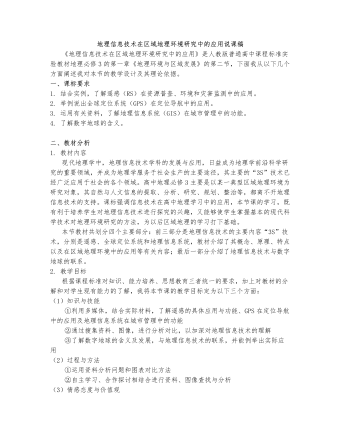
人教版高中地理必修3地理信息技术在区域地理环境研究中的应用说课稿
通过列表对比法、归纳法、、多媒体辅助法等教学方法,突破理论性强、不宜理解的“3S”原理与区别的知识难点。学生更是学会运用图表方法、高效记忆法、合作学习法等方法学习地理知识,增加学习能力。[幻灯片] “3S技术”的应用:地理信息技术的应用十分广泛,从实际身旁的社会生产生活,到地理学的区域地理环境研究。学生的年龄和认知范围决定,此部分的案例教学的运用,前者容易接触到、简单直观、易区分掌握“3S”技术特点和具体应用。而后者涉及地理学科的综合性和区域性的特点,难度较大。针对学情特点,我多以前者案例入手学习,以后者案例加以补充。案例:遥感:(1)视频 专家解说卫星遥感受灾影象(2)教材 图1.6 1998年8月28日洞庭湖及荆江地区卫星遥感图像(3)视频 2008年5月13日“北京一号”卫星提供汶川的灾区遥感图像(4)教材 阅读 遥感在农业方面的应用
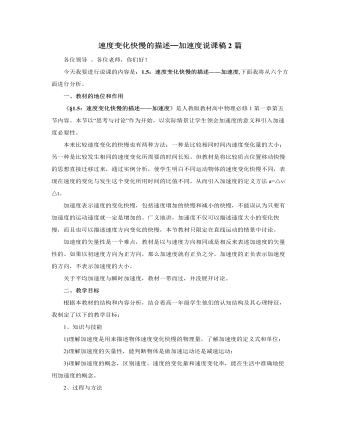
人教版新课标高中物理必修1速度变化快慢的描述─加速度说课稿2篇
本来比较速度变化的快慢也有两种方法:一种是比较相同时间内速度变化量的大小;另一种是比较发生相同的速度变化所需要的时间长短。但教材是将比较质点位置移动快慢的思想直接迁移过来,通过实例分析,使学生明白不同运动物体的速度变化快慢不同,表现在速度的变化与发生这个变化所用时间的比值不同,从而引入加速度的定义方法a=△v/△t。加速度表示速度的变化快慢,包括速度增加的快慢和减小的快慢,不能误认为只要有加速度的运动速度就一定是增加的。广义地讲,加速度不仅可以描述速度大小的变化快慢,而且也可以描述速度方向变化的快慢,本节教材只限定在直线运动的情景中讨论。加速度的矢量性是一个难点,教材是以与速度方向相同或是相反来表述加速度的矢量性的。如果以初速度方向为正方向,那么加速度就有正负之分,加速度的正负表示加速度的方向,不表示加速度的大小。
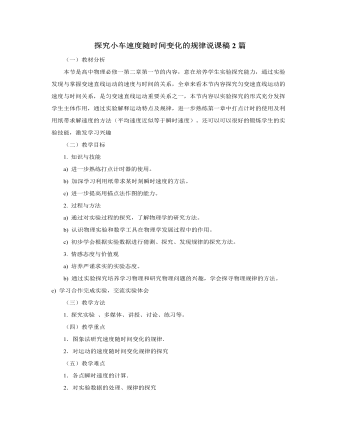
人教版新课标高中物理必修1探究小车速度随时间变化的规律说课稿2篇
(三)合作交流能力提升教师:刚才我们通过实验了解了小车的速度是怎样随时间变化的,但实验中有一定的误差,请同学们讨论并说出可能存在哪些误差,造成误差的原因是什么?(每个实验小组的同学之间进行热烈的讨论)学生:测量出现误差。因为点间距离太小,测量长度时容易产生误差。教师:如何减小这个误差呢?学生:如果测量较长的距离,误差应该小一些。教师:应该采取什么办法?学生:应该取几个点之间的距离作为一个测量长度。教师:好,这就是常用的取“计数点”的方法。我们应该在纸带上每隔几个计时点取作一个计数点,进行编号。分别标为:0、1、2、3……,测各计数点到“0”的距离。以减小测量误差。教师:还有补充吗?学生1:我在坐标系中描点画的图象只集中在坐标原定附近,两条图象没有明显的分开。学生2:描出的几个点不严格的分布在一条直线上,还能画直线吗?
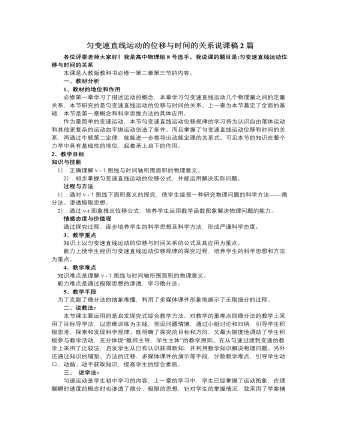
人教版新课标高中物理必修1匀变速直线运动的位移与时间的关系说课稿2篇
培养学生合作交流意识和探究问题的能力,这一部分知识层层递进,符合学生由特殊到一般、由简单到复杂的认知规律。4、互动探究(1)极限思想的渗透让学生阅读“思考与讨论”小版块.培养学生的自学和阅读能力提出下列问题,进行分组讨论:a、用课本上的方法估算位移,其结果比实际位移大还是小?为什么?b、为了提高估算的精确度,时间间隔小些好还是大些好?为什么?针对学生回答的多种可能性加以评价和进一步指导。让学生从讨论的结果中归纳得出:△t越小,对位移的估算就越精确。渗透极限的思想。通过小组内分工合作,讨论交流,培养学生交流合作的精神,以及搜集信息、处理信息的能力;通过小组间对比总结,使学生学会在对比中发现问题,在解决问题过程中提高个人能力;
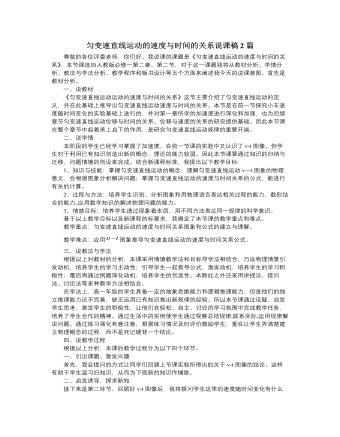
人教版新课标高中物理必修1匀变速直线运动的速度与时间的关系说课稿2篇
设计意图:几道例题及练习题,其中例1小车由静止启动开始行驶,以加速度 做匀加速运动,求2s后的速度大小?进而变式到:小车遇到红灯刹车……,充分体现了“从生活到物理,从物理到社会”的物理教学理念;例题及练习题由浅入深、由易到难、各有侧重,体现新课标提出的让不同的学生在物理上得到不同发展的教学理念。这一环节总的设计意图是反馈教学,内化知识。(6) 小结归纳,拓展深化我的理解是,小结归纳不应该仅仅是知识的简单罗列,而应该是优化认知结构,完善知识体系的一种有效手段,为充分发挥学生的主题作用,从学习的知识、方法、体验是那个方面进行归纳,我设计了这么三个问题:① 通过本节课的学习,你学会了哪些知识;② 通过本节课的学习,你最大的体验是什么;③ 通过本节课的学习,你掌握了哪些学习物理的方法?
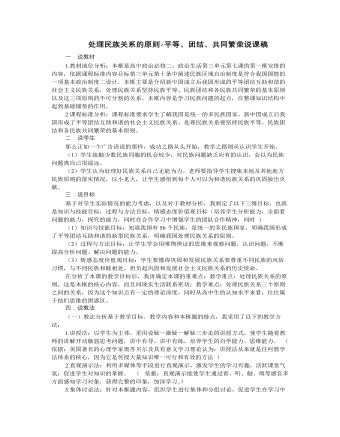
人教版高中政治必修2处理民族关系的原则-平等、团结、共同繁荣说课稿
环节四 情感升华,感悟生活播放《爱我中华》,感受祖国的伟大,民族的团结。设计意图:使学生感受伟大的中华民族的精神,内心产生共鸣,抒发强烈的爱国热情。教师带领学生一起合唱,用歌声结束本堂课内容,能再次唤起学生的爱国情感,使学生认识到:维护国家统一和民族团结是每个公民的义务。环节五 课堂小结 巩固知识本节课我采用线索性的板书,整个知识结构一目了然,为了充分发挥学生在课堂的主体地位,我将课堂小结交由学生完成,请学生根据课堂学习的内容,结合我的板书设计来进行小结,以此来帮助教师在第一时间掌握学生学习信息的反馈,同时培养学生归纳分析能力、概括能力。本节课,我根据建构主义理论,强调学生是学习的中心,学生是知识意义的主动建构者,是信息加工的主体,要强调学生在课堂中的参与性、以及探究性,不仅让他们懂得知识,更让他们相信知识,并且将知识融入到实践当中去,最终达到知、情、意、行的统一。
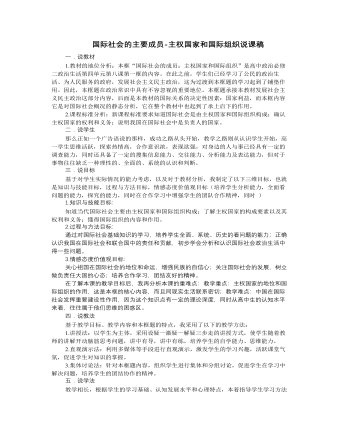
人教版高中政治必修2国际社会的主要成员-主权国家和国际组织说课稿
【教师总结:联合国的会徽的世界地图象征着联合国是一个世界性的国际组织;图案中得橄榄枝象征着和平。联合国采取了很多措施以实现它的宗旨,如对于朝鲜违反国际法规进行核试验,联合国给予警告和制裁,充分体现了它维护国际和平与安全,促进国际合作与发展的宗旨。】对于中国与联合国的关系这部分内容,我将请阅读教材92页几幅图片及材料内容,设置活动探究课中国在联合国的声音和身影,请合作讨论思考以下两个问题,中国与联合国的关系;列举事实说明中国在国际社会中的重要作用。 教师通过剖析中国在联合国的地位和作用,引导学生理解中国在国际社会中发挥着重要作用,是负责任的国家;同时培养学生综合运用知识分析说明问题的能力,使学生感受作为中国人的自豪。【教师总结:中国是联合国的创始国之一,中国作为联合国的创始国和安理会常任理事国之一,一贯遵循联合国宪章的宗旨和原则,积极参与联合国及其专门机构有利于世界和平和发展的活动。】
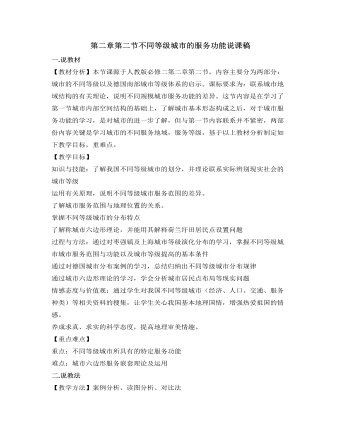
人教版高中地理必修2第二章第二节不同等级城市的服务功能说课稿
【教学目标】知识与技能:了解我国不同等级城市的划分,并理论联系实际辨别现实社会的城市等级运用有关原理,说明不同等级城市服务范围的差异。了解城市服务范围与地理位置的关系。掌握不同等级城市的分布特点了解称城市六边形理论,并能用其解释荷兰圩田居民点设置问题过程与方法:通过对枣强镇及上海城市等级演化分布的学习,掌握不同等级城市城市服务范围与功能以及城市等级提高的基本条件通过对德国城市分布案例的学习,总结归纳出不同等级城市分布规律通过城市六边形理论的学习,学会分析城市居民点布局等现实问题情感态度与价值观:通过学生对我国不同等级城市(经济、人口、交通、服务种类)等相关资料的搜集,让学生关心我国基本地理国情,增强热爱祖国的情感。养成求真、求实的科学态度,提高地理审美情趣。
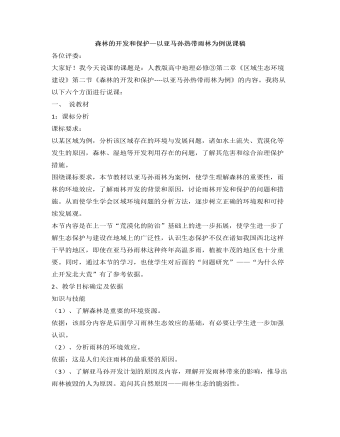
人教版高中地理必修3森林的开发和保护—以亚马孙热带雨林为例说课稿
【这部分的设计目的,要学生明白热带雨林只是一个案例,我们的目的是要合理开发和保护全世界的森林。由森林的开发与保护来明确区域发展过程中产生的环境问题,危害及治理保护措施。】然后知识迁移——东北林区的开发与保护介绍东北地区的森林材料:东北林区是我国最大的天然林区,主要分布于大、小兴安岭及长白山地,在平衡大气成分、净化空气、补给土壤有机质、涵养水源、保持水土、改善地方气候有重要的作用。它还是我国最大的采伐基地,宜林地区广,森林树种丰富。 东北林区开发中的问题及影响点拨:由于人类的严重超采,采育脱节,乱砍滥伐,毁林开荒,再加上森林火灾,东北林区的面积在锐减,带来了严重的生态恶化。我们该如何开发和保护东北地区的森林呢?
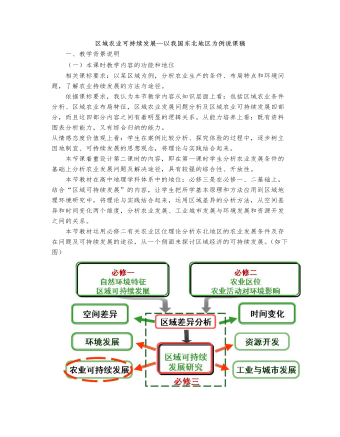
人教版高中地理必修3区域农业可持续发展—以我国东北地区为例说课稿
(3)师生讨论,提升思维深度。教师引领学生将讨论由农业生态破坏、土地利用不合理等表象问题逐步深入到农业结构不合理、农业技术落后等深层问题,提升了学生思维的深度。(4)角色体验,突破难点落实重点。在农民与保护区工作人员的角色体验活动中,学生们尝试换位思考,在冲突与交锋中,在教师的引领下,重新认识环境保护与区域经济发展的关系,在情感体验中加深对可持续发展内涵的理解,小冲突凸显大矛盾是本课设计的创新之处。2.注重对地理问题的探究,突出地理学科本质。地理学科具有综合性、区域性特征,区域差异及人地和谐发展观是我们在教学中应该把握的基本特征,也是我们应当把握的地理学科的本质特征,因此在本节课的设计中我注重抓住地理事物的空间特征、综合性特征,以突出地理学科的本质。
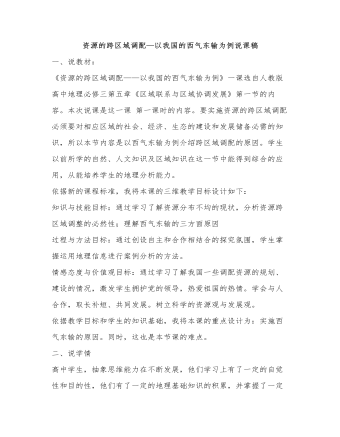
人教版高中地理必修3资源的跨区域调配—以我国的西气东输为例说课稿
由于这部分知识已要求学生在课前收集相关资料探讨分析,,现在提供机会让他们进行交流,充分发表各自的见解。所以,学生对这个知识掌握起来并不难。所以,我对这部分内容不做太多的讲解,只要做进一步的梳理,加深学生的理解即可。 第三是小结环节 在学生对西气东输工程的原因掌握之后进入的是小结环节,这里我进一步提出问题:在西气东输工程段的建设中有没有什么难关? 通过西气东输的难度了解,间接的表现我国的科技的发展,增加学生的爱国情,同时也说明西气东输的建成也有技术这一原因。从而也完成了本课时的小结。 第四环节是作业布置 在这里要求学生课后预习本课剩下的内容:思考西气东输对区域发展的影响以及为何要实施资源的跨区域调配。通过这样的问题一方面为下节课学习奠定基础,另一方面体现本课学习从“个”到“类”从特殊到一般的过程。





















